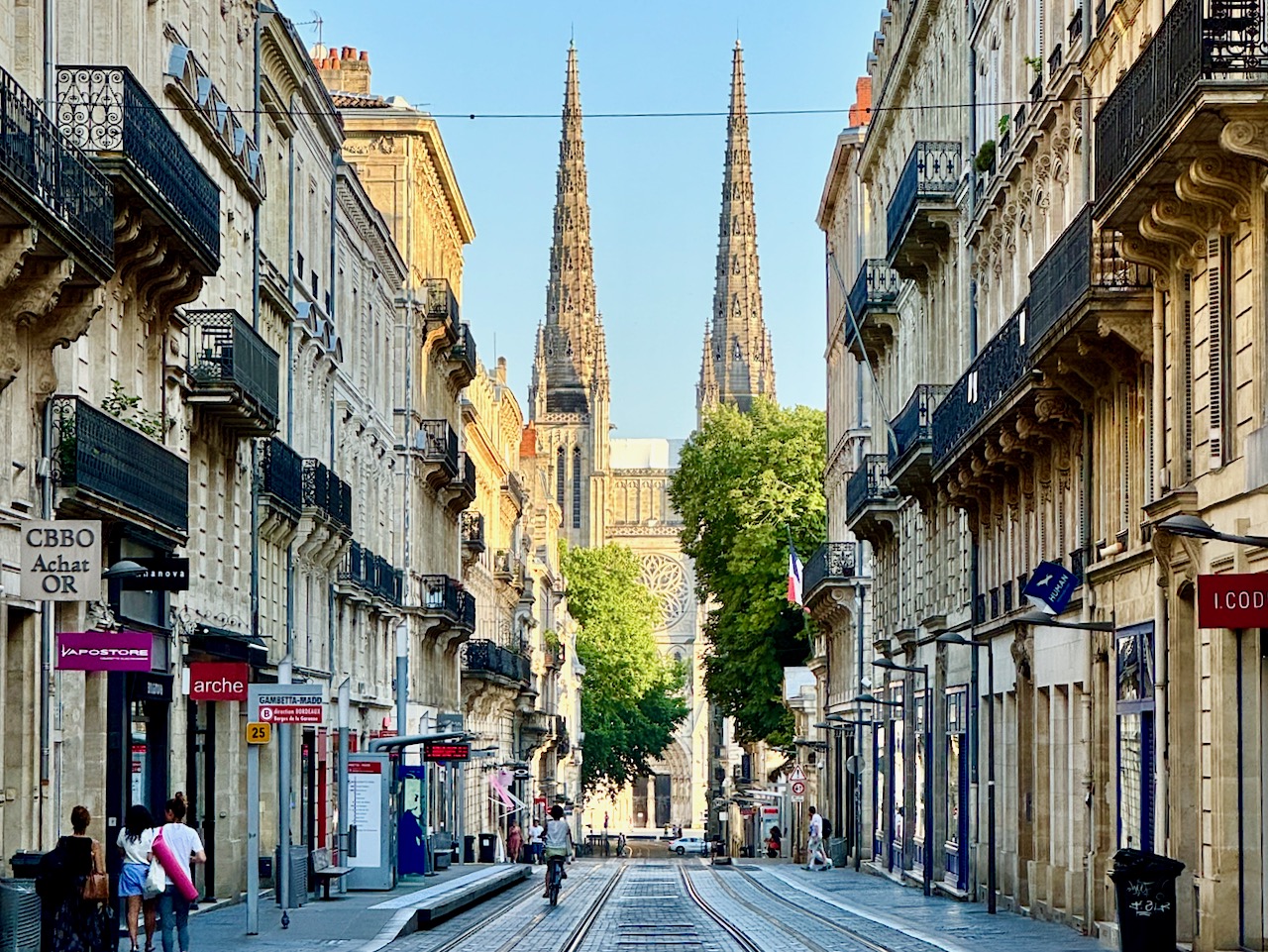
Bordeaux is a port city in southwestern France on the shores of the Garonne River. Known the world over as the ‘City of Wine’, Bordeaux, as I quickly found out, is absolutely worth visiting. Its historic city centre, a UNESCO World Heritage site, is packed with magnificent buildings and remnants from the city’s medieval past, as well as charming lanes and squares filled with cosy cafés and restaurants. I spent several days crisscrossing the city on foot and instantly fell in love with the city. With its impressive architecture, laid-back lifestyle, amazing food and wine scene, and some of the friendliest people in the country, Bordeaux is a city I could actually see myself living in! There are a lot of things to see in Bordeaux, and the best part is, the city’s compact nature makes it easy to explore on foot.
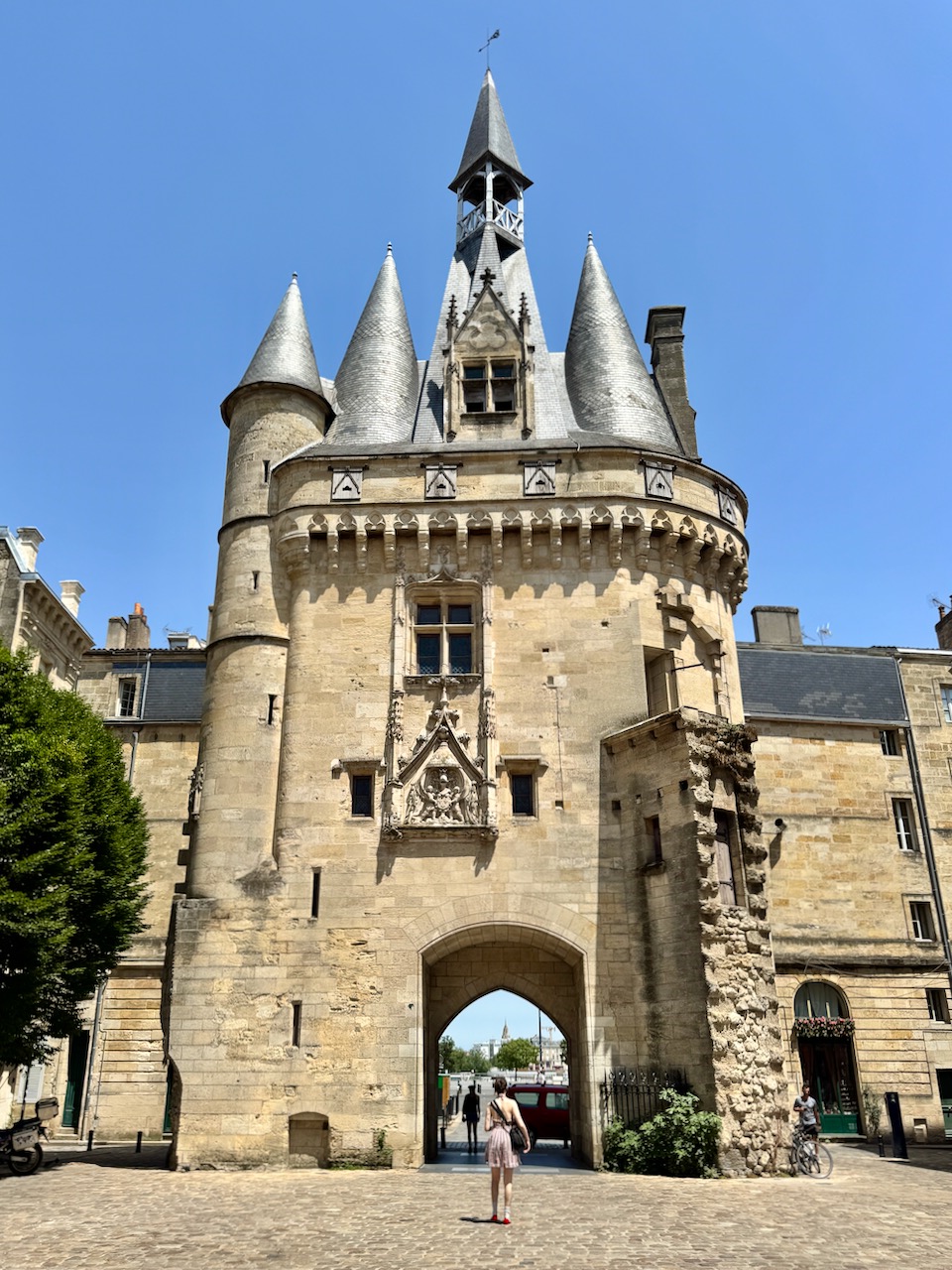 Porte Cailhau
Porte Cailhau

A (very) brief history of Bordeaux
Bordeaux was founded by the Celts as Burdigala around the 3rd century B.C.. It became a key Roman port and later flourished as a centre of trade, especially for wine. In the Middle Ages, it came under English control through the marriage of Eleanor of Aquitaine to Henry II, boosting its wine exports to England. Bordeaux returned to French rule in 1453 after the Hundred Years’ War.
The 18th century marked a golden age, with wealth from trade fuelling grand urban redevelopment – wide avenues, neoclassical buildings, and landmarks like Place de la Bourse transformed the city. The 19th century saw continued modernisation with railways, bridges, and expanded port facilities. In recent decades, it has undergone major revitalisation, including the restoration of historic areas, new public transport like trams, and riverside renewal. Today, Bordeaux is a UNESCO World Heritage Site and a global centre for wine, culture, and tourism.
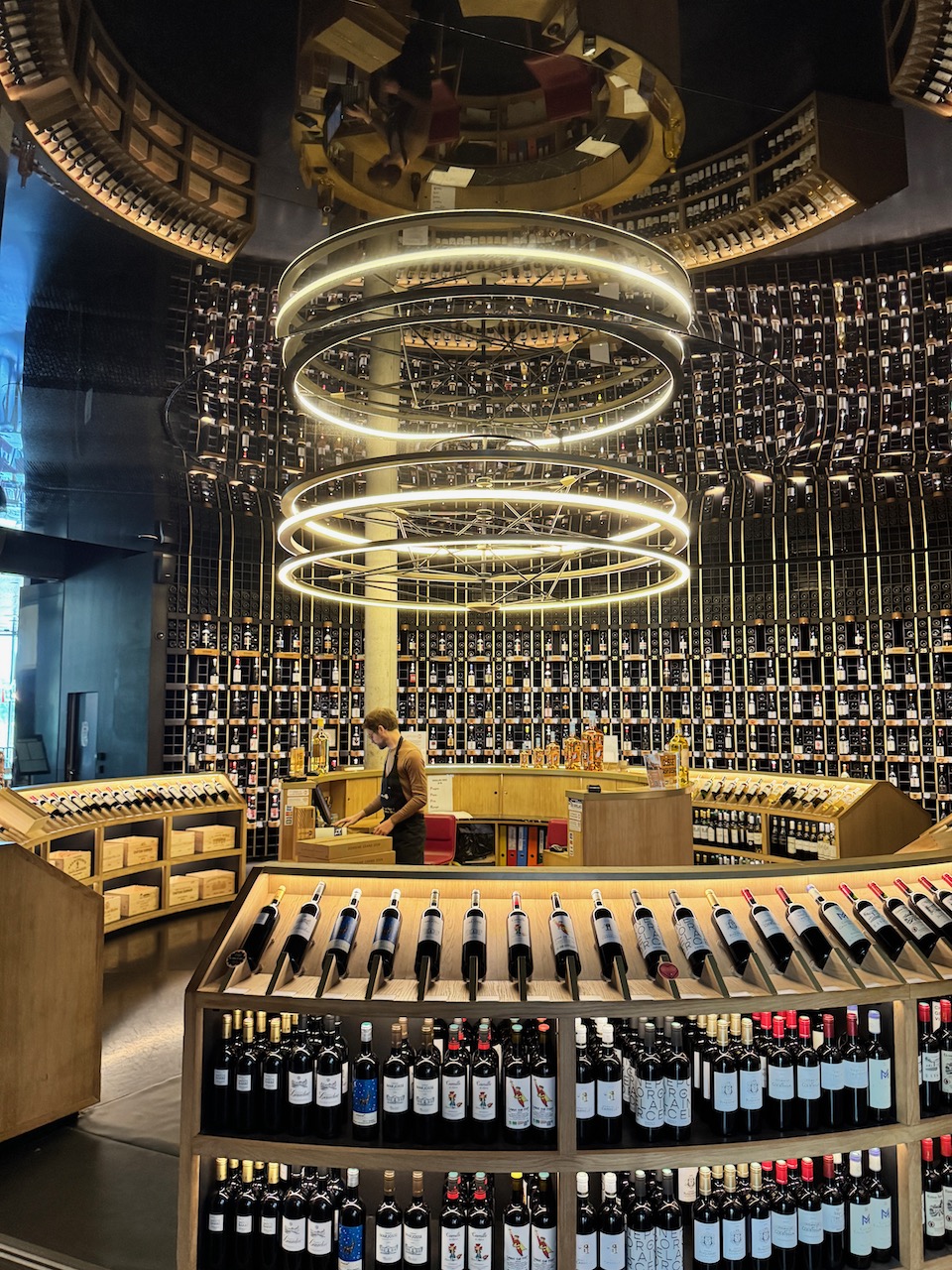 Cité du Vin wine museum
Cité du Vin wine museum
My opportunity to visit Bordeaux came when I joined Avalon Waterways on their Bordeaux river cruise. This allowed me to explore the city from the comfort of the ship that was moored in the city centre. As I strolled around, my first impression, drawn from its grand boulevards and squares, and neoclassical buildings, was that it resembled (a smaller version of) Paris. I later learned that Baron Haussmann, the architect of modern-day Paris, actually used Bordeaux’s 18th century rebuilding as a template for what he envisioned for Paris.
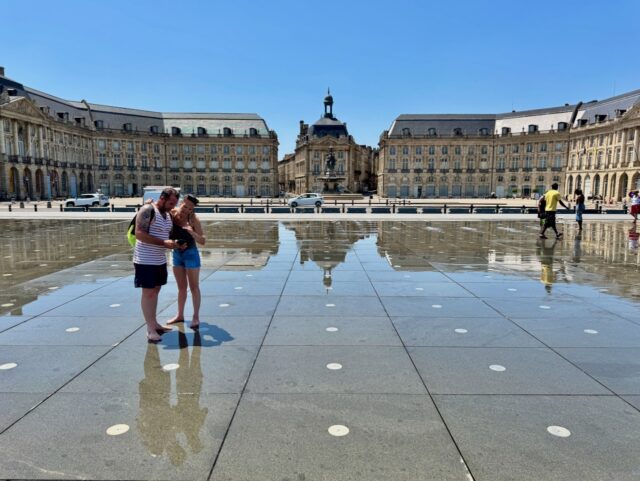 Place de la Bourse
Place de la Bourse
There’s lots to see in the historic centre of Bordeaux so I recommend taking your time to simply soak up the wonderful atmosphere, visit a few museums and churches, and explore the different districts, each with its own distinct character.
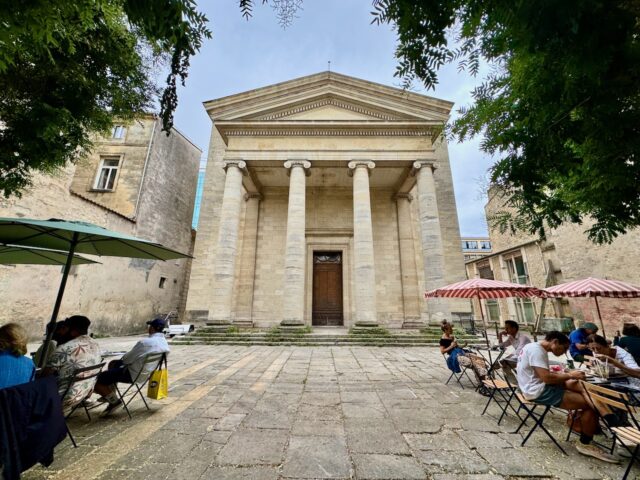 Chartrons dictrict
Chartrons dictrict
Below, you’ll find my walking route that covers the top things to see in Bordeaux. It can be done in 1-2 days but feel free to stray off the route – you’ll find lots of terrific restaurants and cafés, quiet squares, picturesque lanes and simply gorgeous architecture. I’ve created two walking routes, both of which start at the Place des Quinconces. One route heads south through the Old Town to the Saint-Michel district. The other heads north through the Chartrons district to the Cité du Vin wine museum. These routes cover the city’s historic left bank. The right bank, with attractions such as the Botanical Gardens, is also worth visiting but only if you’re spending more time in the city.
Historic Bordeaux southern route
This southern route through the Bordeaux Old Town and Saint-Michel district passes many of the city’s main highlights. It can be done in 1-2 days, making it an ideal Bordeaux itinerary if you’re visiting for a weekend or if you have limited time in the city.
Place des Quinconces
Start your walk at the vast Place des Quinconces, one of the largest city squares in Europe, with its stunning Monument aux Girondins, a towering column with a grand fountain at its base.
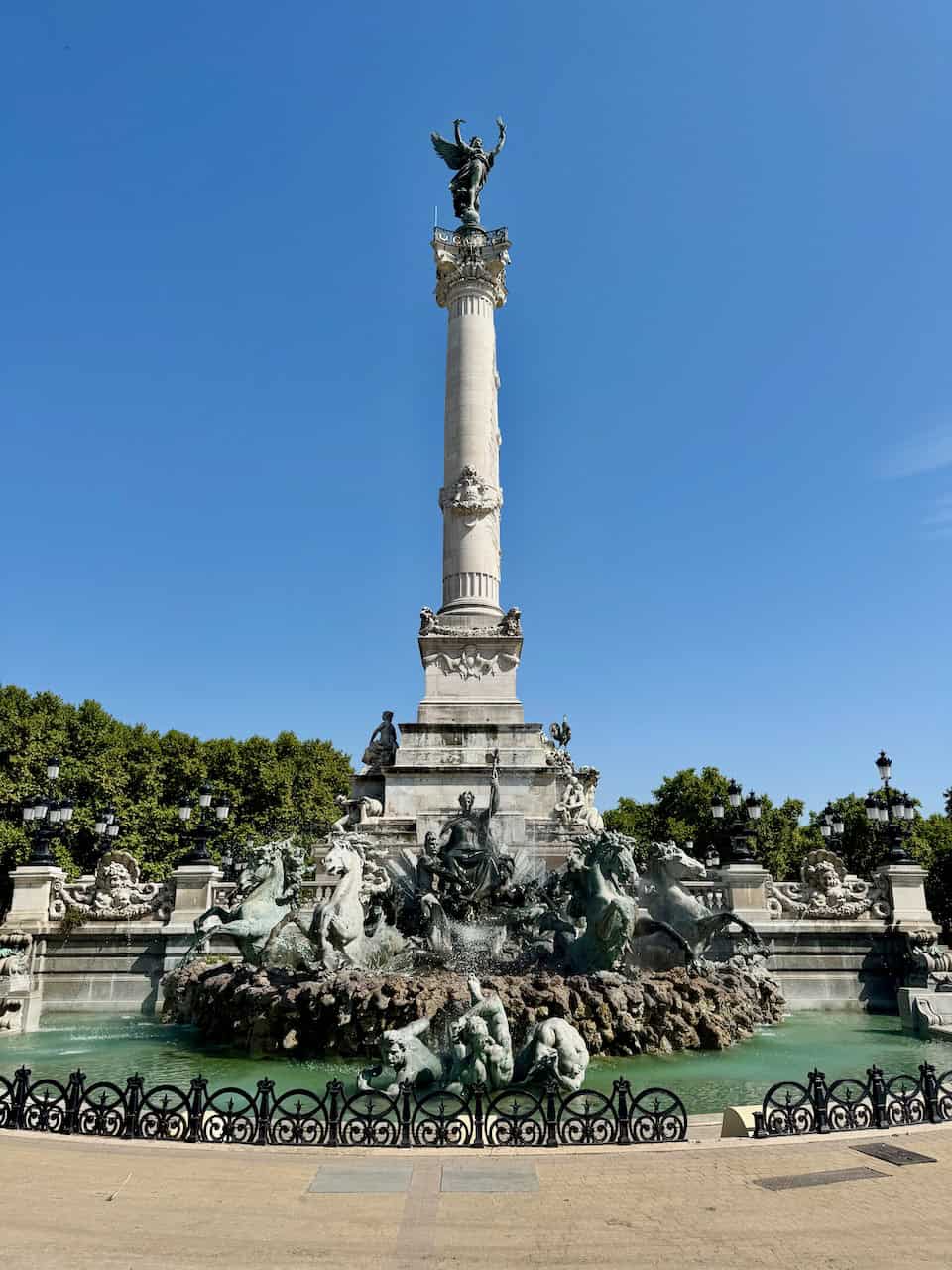 Monument aux Girondins
Monument aux Girondins
Grand Théâtre de Bordeaux
From Place des Quinconces, head south to the Grand Théâtre de Bordeaux, the city’s grand opera house, built in the 18th century in a neoclassical style. Along the way, you’ll pass the Bordeaux Tourist Office where you can pick up a Bordeaux City Card (that provides free public transportation and entry to numerous attractions and museums) or book a tour.
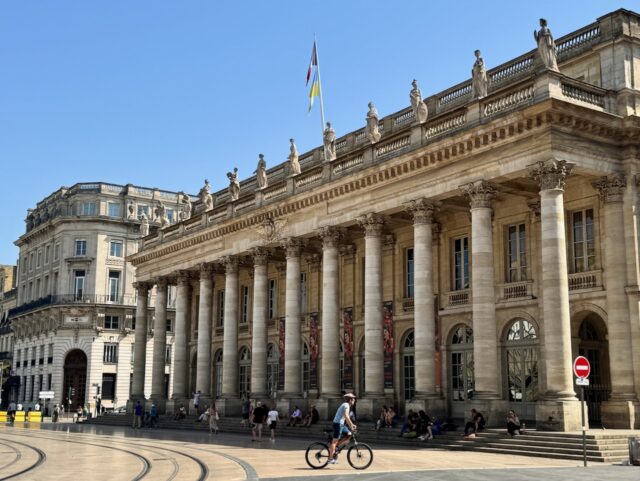 Grand Théâtre de Bordeaux
Grand Théâtre de Bordeaux
Rue Sainte-Catherine
Located a stone’s throw from the Grand Théâtre de Bordeaux, Rue Sainte-Catherine is the longest pedestrian shopping street in France. The top of the street is home to more exclusive boutiques and department stores, whilst the southern end has a wide range of discount stores.
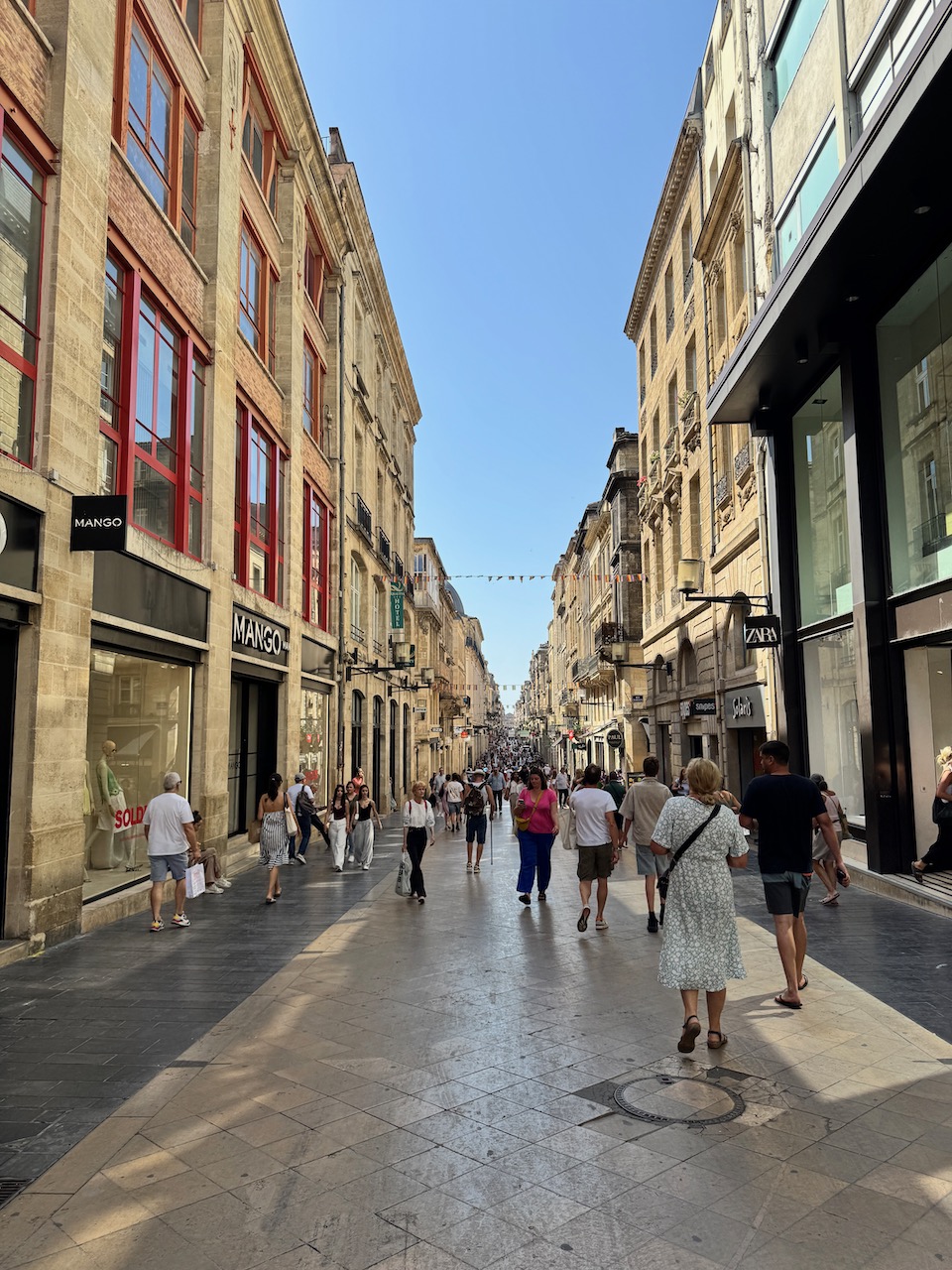 Rue Sainte-Catherine
Rue Sainte-Catherine
Before you enter Rue Sainte-Catherine, take a moment to admire Cours de l’Intendance, an impressive avenue lined by neoclassical buildings.
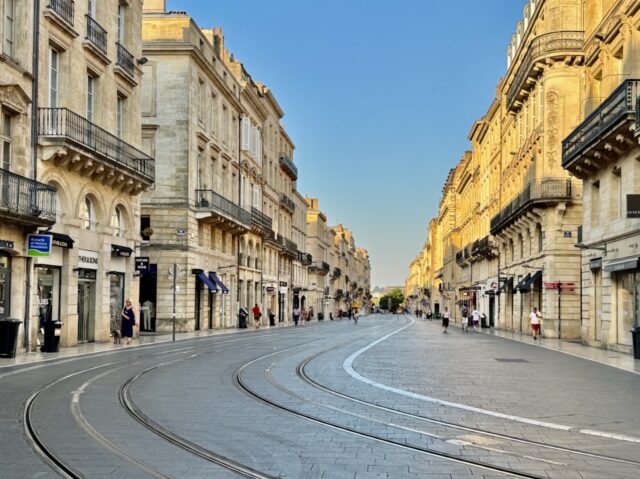 Cours de l’Intendance
Cours de l’Intendance
Saint-Pierre district
The Saint-Pierre district is the oldest part of Bordeaux, and the most visited. Its maze of atmospheric lanes and squares is a joy to explore. There’s a lot here that will grab your attention, from colourful stores to hip wine bars and top-notch restaurants, and stately buildings to hidden courtyards.
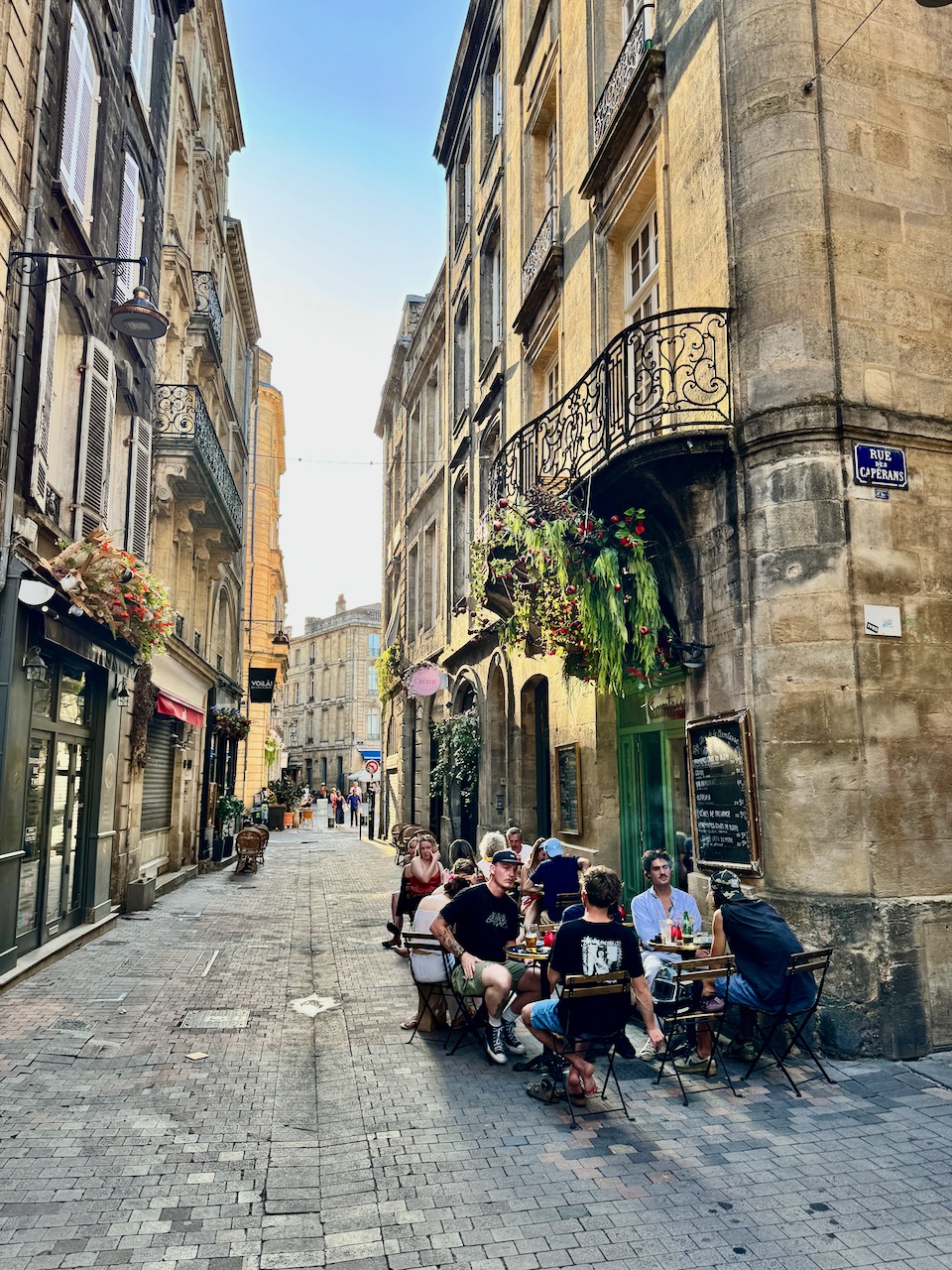 A street in the Saint-Pierre district
A street in the Saint-Pierre district
Some of the most lively squares include Place du Parlement, Place Saint-Pierre (the oldest part of the city, dating from the 3rd century) and Place Camille Jullian.
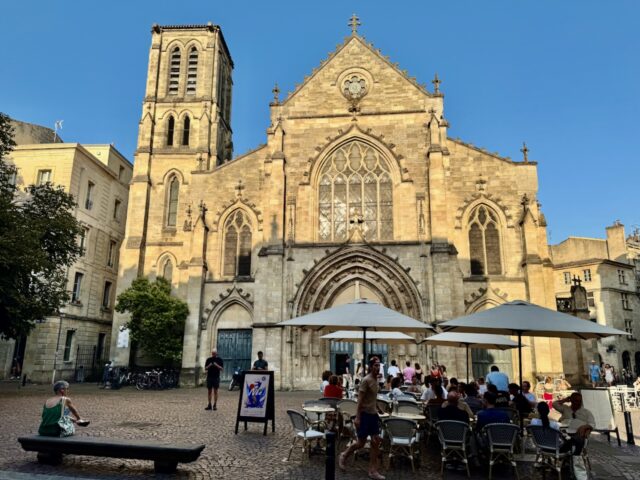 Place Saint-Pierre
Place Saint-Pierre
From Rue Saint-Catherine, take a left into any of the side streets (such as Rue Parlement Saint-Pierre) in the direction of Place du Parlement. If you have time, I recommend spending a few hours to stroll around Saint-Pierre’s beautiful cobbled streets, grab a coffee or a wine and enjoy a meal. Restaurants I can recommend include Berthus and Vivants.
Place de la Bourse
Place de la Bourse (Stock Exchange Square) is an iconic landmark. A massive square lined by grand neoclassical buildings, it was built in the 18th century by the chief architect of King Louis XV.
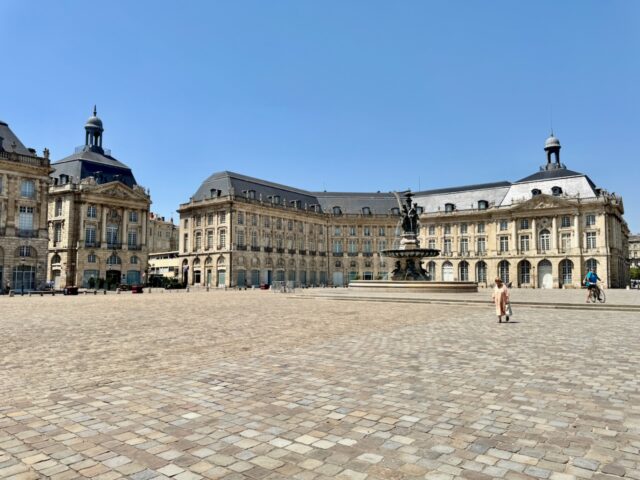 Place de la Bourse
Place de la Bourse
Cross the road to visit the Miroir d’eau, a large reflection pool, which is a popular spot for both locals and visitors, especially in the summer. The pool is one of the top photography spots in Bordeaux as it reflects the beautiful façades of Place de la Bourse.
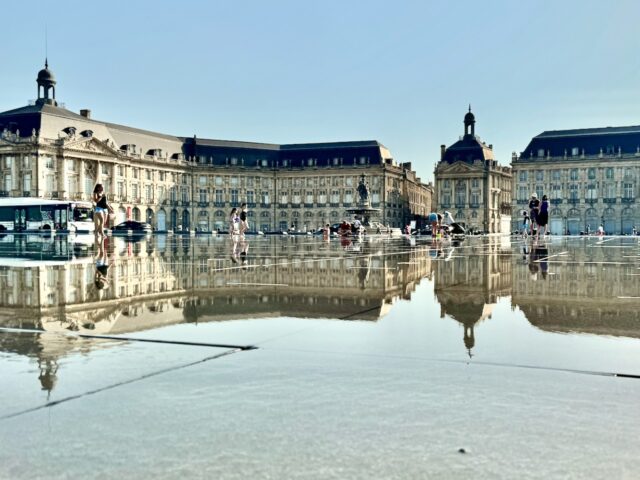 The reflection pool
The reflection pool
From here, stroll around the gardens and the lively Garonne promenade as you make your way towards Porte Cailhau.
Porte Cailhau
One of several medieval city gates that survived the city’s redevelopment in the 18th century, Porte Cailhau is an absolute gem.
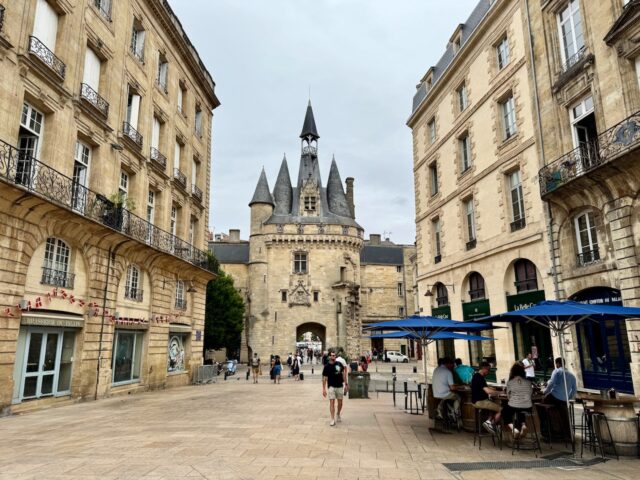 Porte Cailhau
Porte Cailhau
From here, make your way through the Saint-Pierre district to the Cathedral – a lovely street to follow is Rue du Loup.
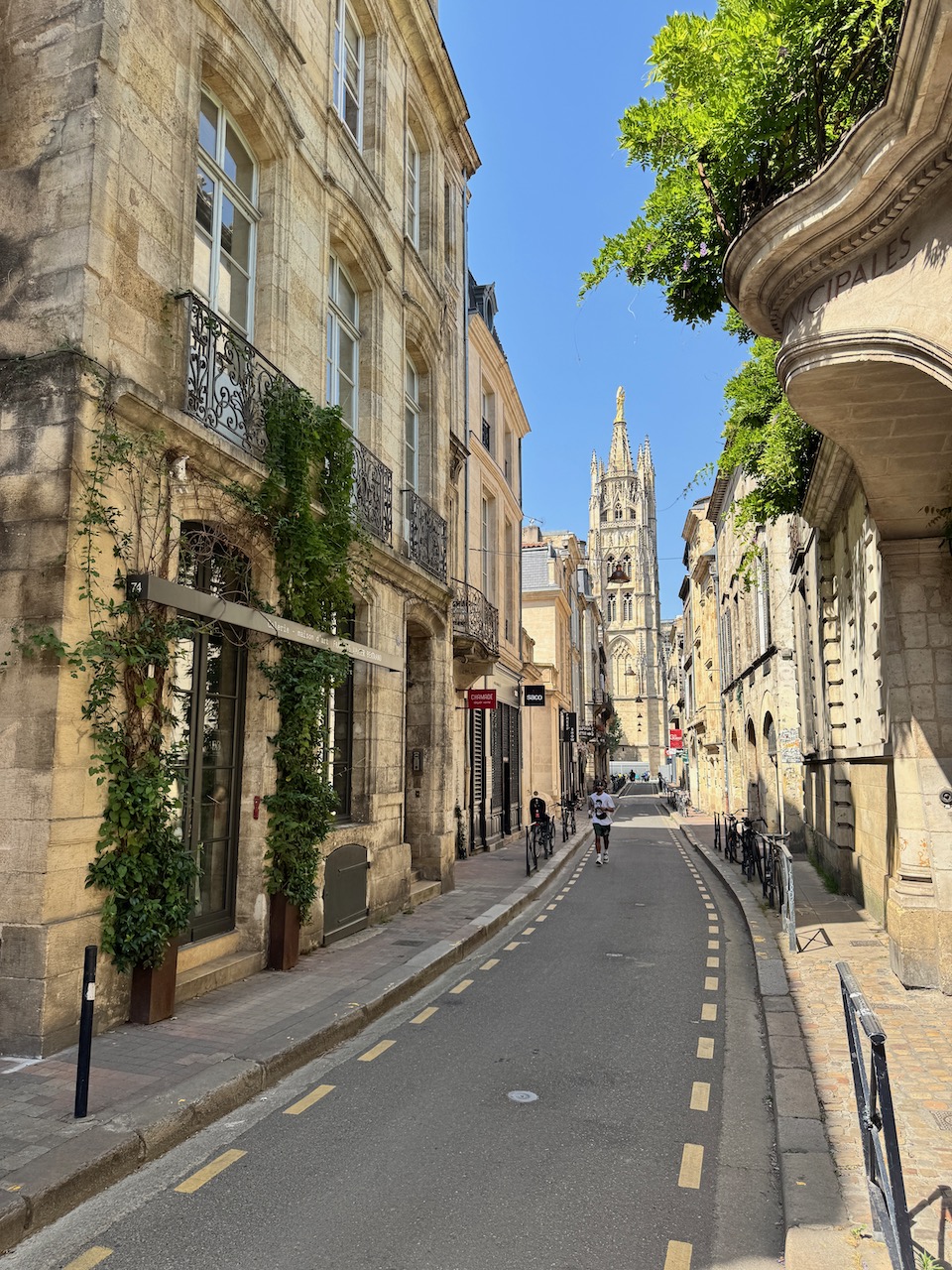 Rue du Loup
Rue du Loup
Cathédrale Saint-André de Bordeaux and Tour Pey Berland
The seat of the Archbishop of Bordeaux, the Bordeaux Cathedral was consecrated by Pope Urban II in 1096. However, much of the French Gothic structure that stands today originated from the 14th-15th centuries.
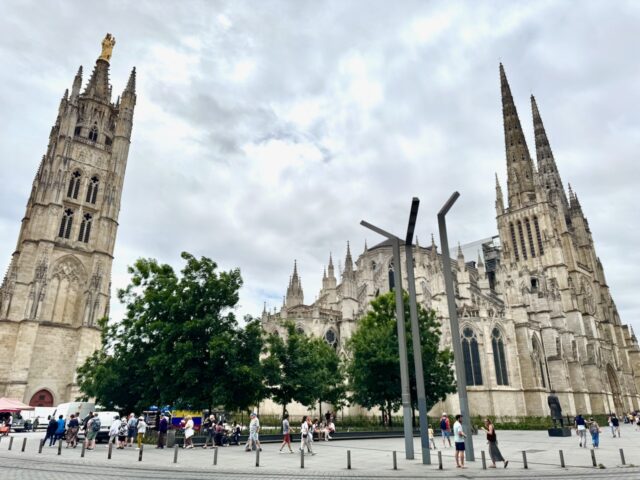 Bordeaux Cathedral and Tour Pey Berland
Bordeaux Cathedral and Tour Pey Berland
During the summer months, classical concerts are often held in the evenings in the Cathedral. If you’d like just a taste of the ambiance, visit the Cathedral in the afternoon (after 3pm) and you might catch a rehearsal.
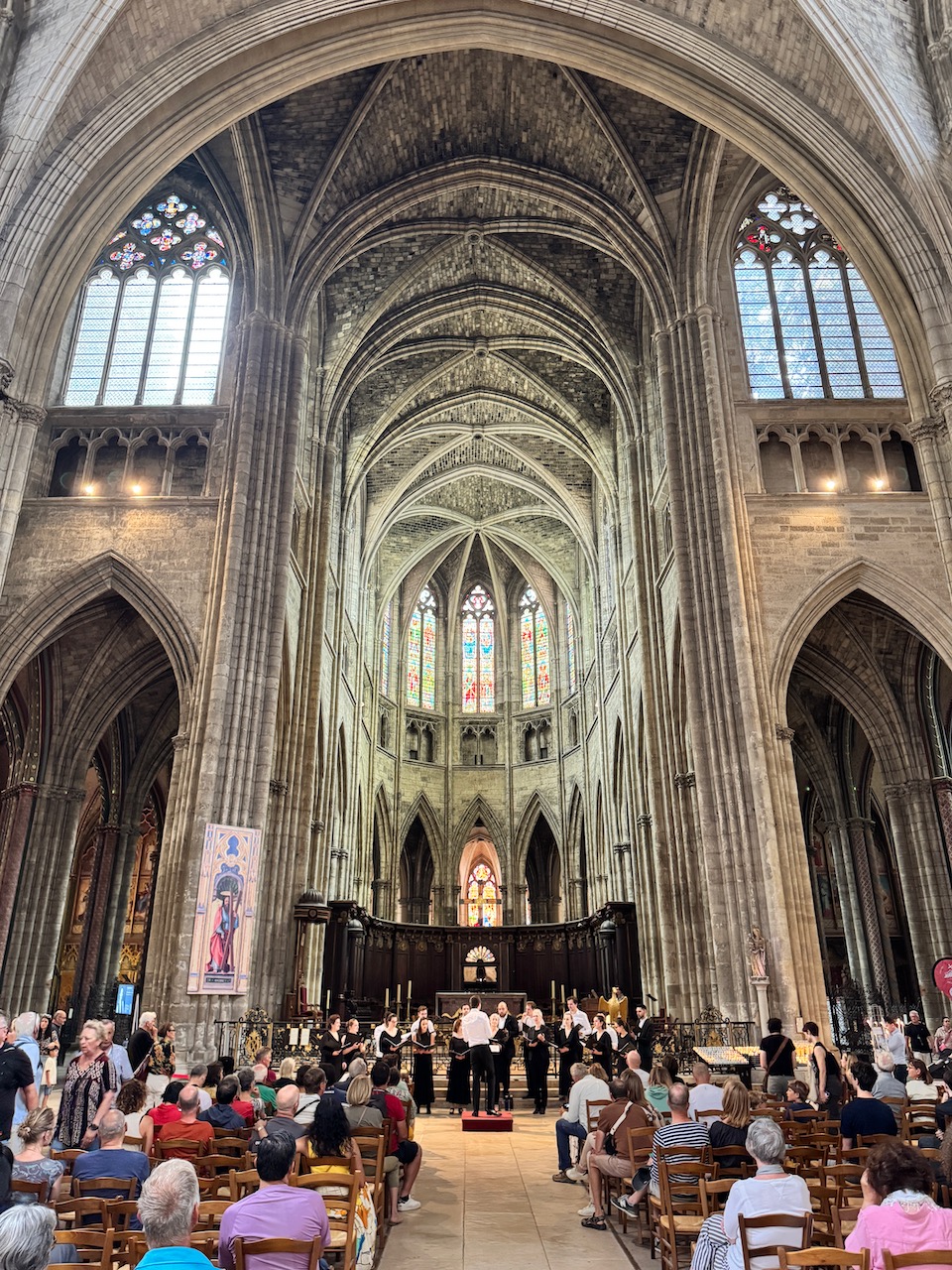 Inside the Cathedral (during a rehearsal)
Inside the Cathedral (during a rehearsal)
Next to the Cathedral stands the 15th century Tour Pey Berland, a separate church tower. The tower is open to the public, and for a small entrance fee, visitors can climb the 231 steps to the top for panoramic views of Bordeaux.
Grosse Cloche
From the Cathedral, head towards Place Fernand Lafargue, then continue along Rue Saint-James, one of the most beautiful streets in Bordeaux. At the end of the street stands the impressive Grosse Cloche medieval city gate, one of the top things to see in Bordeaux. Composed of two circular towers and a central bell-tower, it’s straight out of a fairytale!
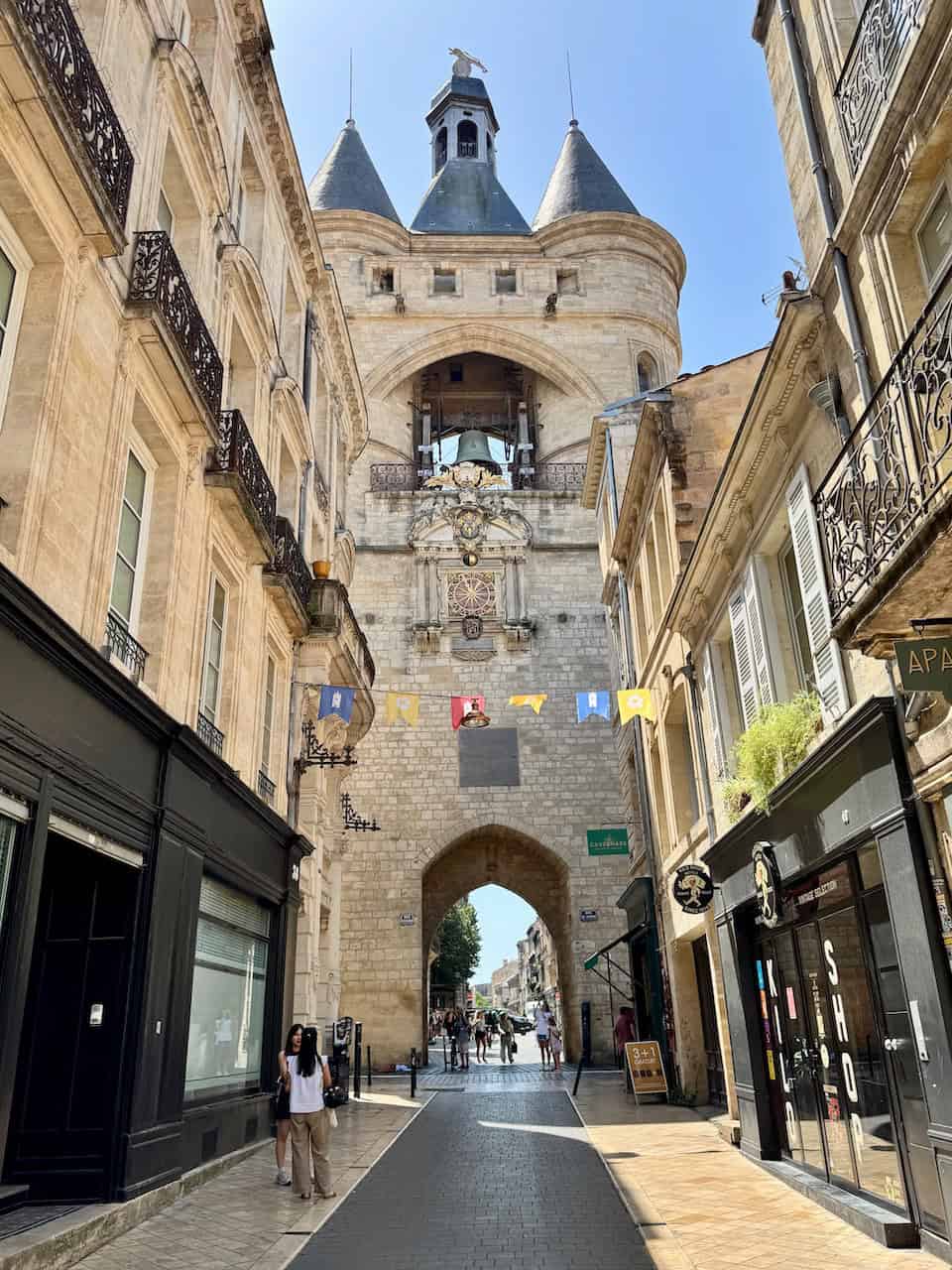 Grosse Cloche seen from Rue Saint-James
Grosse Cloche seen from Rue Saint-James
Saint-Michel district
Across the street (Cours Victor Hugo) from the Grosse Cloche is the Saint-Michel district. I spent quite a bit of time exploring this area and enjoyed its authentic Bordeaux atmosphere. There are lots of cool stores, bustling markets, excellent eateries, antique shops and art galleries to browse around. One restaurant I can recommend is Au Bistrot, a cosy place with an open kitchen. The food is simply divine!
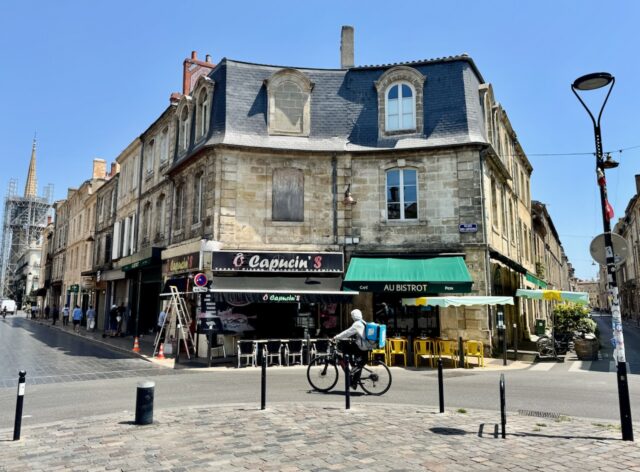 Au Bistrot in the Saint-Michel district
Au Bistrot in the Saint-Michel district
The main attraction in the district is the Basilique Saint-Michel and its bell-tower, La Fleche. At 114 meters, La Fleche is the tallest bell tower in southern France and can be climbed. I’ve been told that it offers the best view of Bordeaux, even better than the view from Tour Pey Berland.
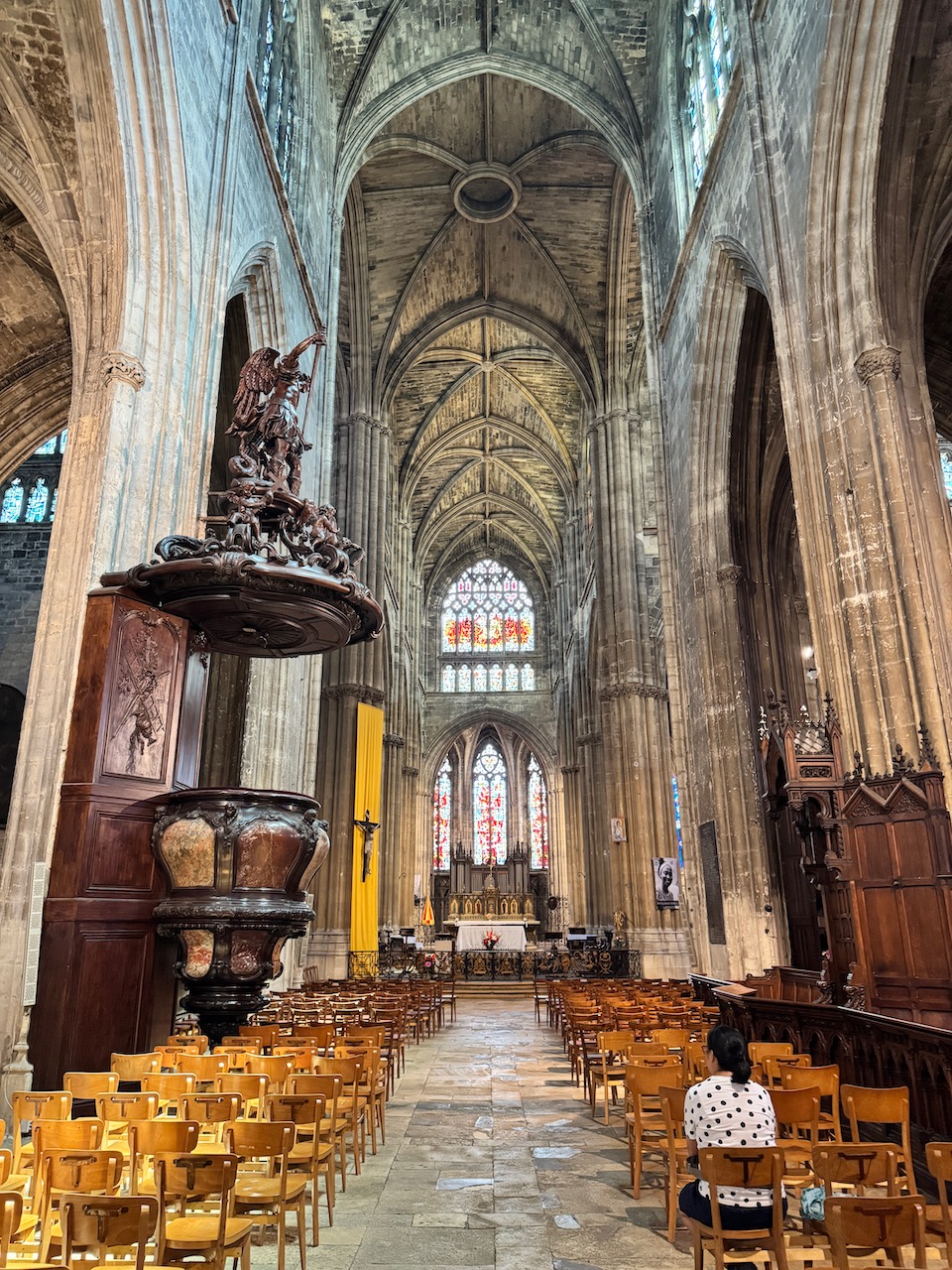 Basilique Saint-Michel
Basilique Saint-Michel
Saint-Michel markets
Marché des Capucins is the largest covered market in the city and is a great place to browse around the food stalls and even have lunch. If you’re in the district on a Saturday morning, don’t miss the Marché Royal, a large open-air market on Place Meynard. For fans of antiques and art, check out Passage Saint-Michel, located just across from the Basilique. Every Sunday morning, the square in front of the Basilique transforms into a giant flea market.
Pont de Pierre
Our last stop on this walking route around the historic centre of Bordeaux is the Pont de Pierre. Commissioned by Napoleon I, this stone bridge that crosses the Garonne River has 17 arches and a length of 487 meters.
Chartrons dictrict and Cité du Vins northern route
This northern walking route covers a unique Roman amphiteatre, the charming Chartrons district as well as the futuristic Cité du Vin wine museum. It can easily be done in a day.
Palais Galliens
From Place des Quinconces, walk up Rue Fondaudege and turn left to Palais Galliens. The Palais Galliens is a Gallo-Roman amphitheatre, built in the 2nd century A.D., that once accommodated up to 20,000 spectators. These days, a residential neighbourhood surrounds the ruins of this ancient structure, making it a somewhat surreal sight.
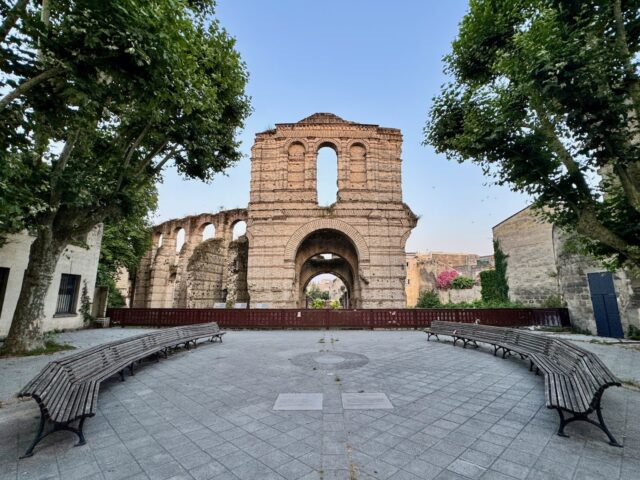 Palais Gallien
Palais Gallien
Jardin Botanique du Jardin Publique
Your next stop is the Jardin Botanique du Jardin Publique (Public Botanical Gardens), a local favourite at any time of the year. Enjoy the lush surroundings and tranquil lakes as you make your way to the Chartrons district.
Along the way to Chartrons, consider a visit to the CAPC Contemporary Art Museum, a renowned museum housed in a 19th century warehouse.
Chartrons district
I spent half a day traversing this wonderful district, with its gorgeous houses, stylish boutiques, artisanal studios and lovely cafés. For the purposes of this walking route, I chose Rue Notre Dame as I absolutely loved this street. However, feel free to branch off into the side streets and wander around.
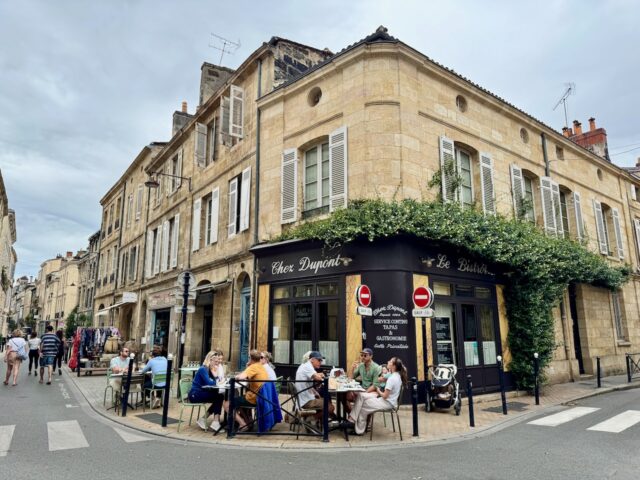 Chartrons
Chartrons
This is the perfect area to soak up the local Bordeaux atmosphere. I recommend strolling around casually, browsing around the shops and enjoying a coffee at one of the many cafés.
 A brocante, or vintage/antique store in Chartrons
A brocante, or vintage/antique store in Chartrons 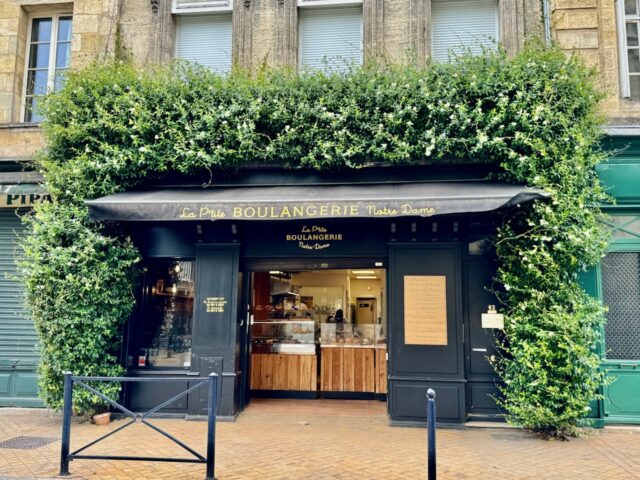 Chartrons bakery
Chartrons bakery
Places to look out for include the Église Saint-Louis-des-Chartrons de Bordeaux (a beautiful 19th century church), the Halles de Chartrons (a 19th century concert hall surrounded by cafés) and the Musée du Vin et du Négoce de Bordeaux (a small wine museum that provides excellent info about Bordeaux wines, and you can taste some too).
Cité du Vin
If you have time, follow the walking route along the Garonne promenade (or take the tram) to the Bacalan port district. Continue until you see a futuristic-looking building that resembles a decanter. That’s the Cité du Vin. Opened in 2017, this wine museum not only showcases wines from the Bordeaux region but also from other wine regions around the world. It has quickly become one of the top attractions in Bordeaux since its opening.
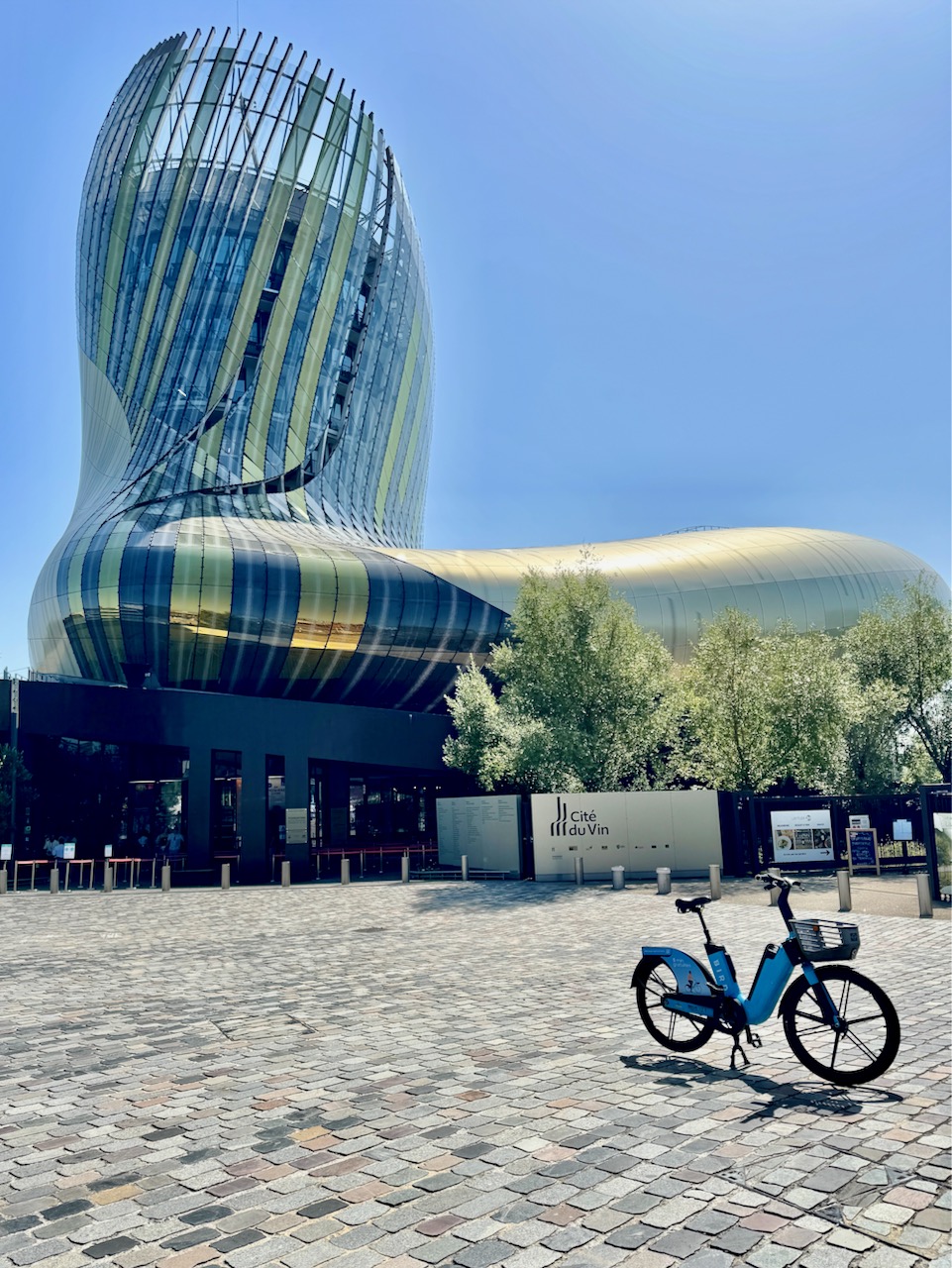 Cité du Vin
Cité du Vin
You can easily spend 1.5 hours viewing the exhibits and video shows. At the end of the tour, take the elevator to the top floor for a glass of wine and beautiful views of Bordeaux.
Bassins des Lumières
Another popular Bordeaux attraction in the Bacalan district is the Bassins des Lumières. Formerly a Nazi WWII submarine base, it was too costly to demolish after the war – the roof alone was 9 meters thick! In 2020, part of this vast facility was transformed by Culturespaces into the largest digital art centre in the world. I’ve been to Culturespaces’s other venues such as the Carrières des Lumières in the Provence and Fabrique des Lumières in Amsterdam, and this one in Bordeaux is just as amazing.
How to get to Bordeaux
Bordeaux has an airport with frequent flights to major European cities. The airport is connected to the city centre via a tram line (about 50 minutes). The main train station is Bordeaux-Saint-Jean with many services to other cities in France such as Paris and Toulouse.
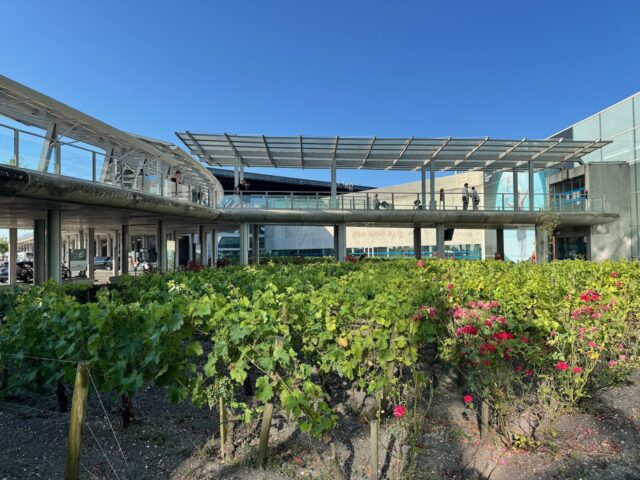 Vineyard at Bordeaux Airport
Vineyard at Bordeaux Airport
Where to stay in Bordeaux
There are many accommodation options in Bordeaux, from five-star hotels to family-owned B&Bs. Prior to boarding the ship, I stayed at the lovely Hotel de Tourny. The room was very comfortable and the hotel’s location, at the edge of the old town, was absolutely perfect!
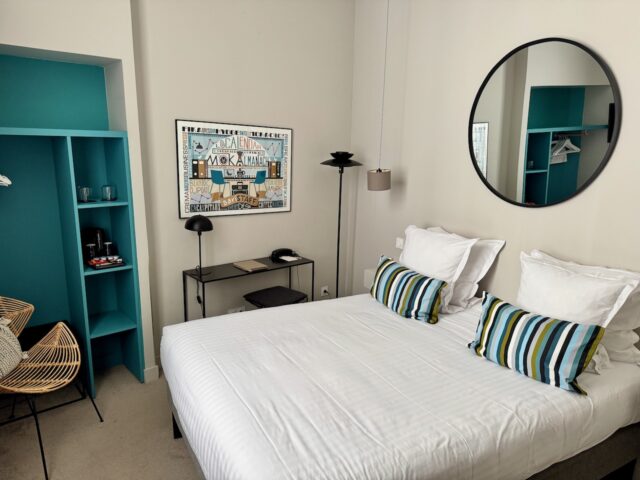 Room at Hotel de Tourny
Room at Hotel de Tourny
Please visit:
Our Sponsor
